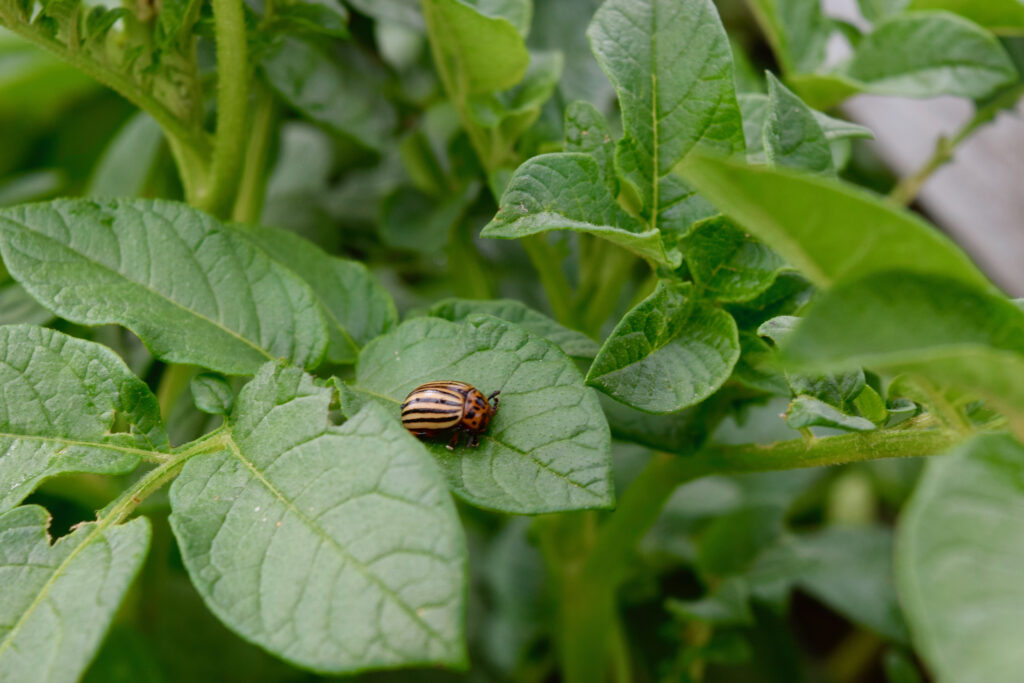
Winning the fight against Colorado Potato Beetles
How Delegate® WG insecticide helps growers protect yield potential, supports beneficial insects
(Sponsored) The Colorado Potato Beetle (CPB) continues to challenge potato growers across North America, particularly in the West, where it remains one of the most destructive pests each growing season. Both larvae and adult beetles feed aggressively on potato foliage, and left uncontrolled, they can completely defoliate plants — leading to devastating yield losses of up to 80 percent. Colorado potato beetles have developed resistance to many commonly used insecticides, making control even more difficult. For growers, this not only threatens yield but also directly impacts their bottom line.
That’s where Delegate® WG insecticide comes in. Powered by spinetoram, a unique active ingredient with a distinct mode of action, Delegate WG insecticide with Jemvelva™ active offers a reliable tool for managing CPB populations, even in the face of growing resistance. As an IRAC Group 5 insecticide, it provides a powerful knockdown effect with minimal impact on beneficial insects, helping to preserve the overall ecosystem of the field.
Delegate WG insecticide at a glance:
- Distinct active ingredient: Spinetoram is an IRAC Group 5
- Resistance management tool: Rotating Delegate WG insecticide with other effective modes of action helps preserve the efficacy of each insecticide.
- Residual activity: Delegate WG insecticide is fast-acting with extended residual.
- Convenient and flexible: 7-day re-entry and pre-harvest interval
- Beneficials: Delegate WG insecticide targets yield-robbing insects, but it is soft on beneficials.
- Marketability: Delegate WG helps growers protect the marketability of their potatoes.
With more than 15 years of experience in potato crop production, Kevin Cochrane, territory manager at Corteva Agriscience, supports growers in producing high-quality crops by helping identify the most effective solutions from the comprehensive portfolio of fungicides, insecticides, herbicides and biologicals at Corteva.
 “The CPB has been an emerging pest for many growers, specifically in the PNW [Pacific Northwest] over the last several years,” Cochrane said. “We had a relatively warm winter this season, so we expect to see an increase in surviving pests. We anticipate pressure will be high.”
“The CPB has been an emerging pest for many growers, specifically in the PNW [Pacific Northwest] over the last several years,” Cochrane said. “We had a relatively warm winter this season, so we expect to see an increase in surviving pests. We anticipate pressure will be high.”
Cochrane recommends that growers protect their crops early and apply Delegate WG insecticide with minimal water. If applying insecticides through chemigation, use as little water as possible to ensure the product stays concentrated and effective. Timely scouting is critical, especially when it comes to getting accurate in-field counts of CPB populations. Applying at around 50 percent egg hatch is ideal, as this timing ensures the emerging larvae come into direct contact with the insecticide, leading to greater mortality and better control.
“A CPB population is something you don’t want to let get out of hand. They get physically harder to control, and the warmer the season gets, the more often they reproduce,” Cochrane said.
When it comes to managing the persistent threat of the CPB, many growers rely on proven, effective solutions. Cochrane emphasizes the value of using a targeted approach that protects both yield potential and the beneficial insects that support a healthy crop ecosystem.
“Delegate WG insecticide is widely considered the go-to chemistry for Colorado potato beetle control,” Cochrane said. “Delegate WG insecticide is a spinetoram-chemistry that is soft on beneficial insects in the field and hard on the targeted pests. This is a great win for the growers because they can preserve beneficials that might offer biological control of pests but still control CPB populations in the field.”
In addition to your local ag retailer, you can learn more about Delegate WG insecticide by visiting Corteva.us/CPBcontrol.
®, ™ Trademark of Corteva Agriscience and its affiliated companies. Always read and follow label directions. © 2025 Corteva Agriscience.














